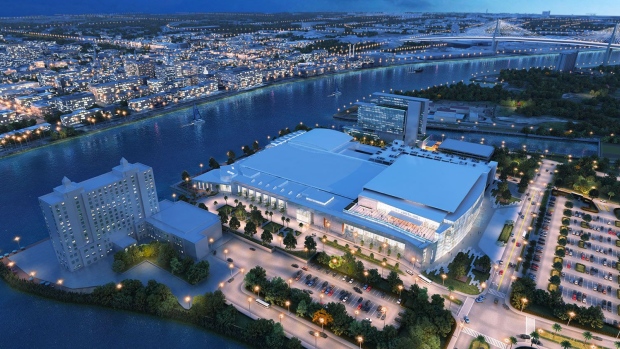Apr 9, 2024
Savannah Convention Center Gets Boost to Bond Capacity for Hotel
, Bloomberg News

(Bloomberg) -- The Savannah-Georgia Convention Center Authority, just wrapping up a $276 million expansion, is now set to tap the municipal market to finance a new hotel, thanks to legislators’ move to boost the agency’s bonding capacity.
State lawmakers raised its debt limit to $400 million from $50 million this session to help finance the facility, and the legislation is awaiting Governor Brian Kemp’s signature.
The authority would bond for the proposed 400-room hotel project, said Kelvin D. Moore, general manager of the convention center, said. The new project is “in the initial stages of pre-development,” he said, and he wouldn’t speculate on the selection of underwriters or when the deal might be sold.
Cities from coast to coast have long embraced convention centers as economic engines, with varying results. A more modern economic philosophy dictates that what the center itself makes in revenue, fees and rentals is or should be almost irrelevant. The real money is made on what convention-goers spend in bars, restaurants, retail establishments, museums, stadiums and hotels.
The Savannah Convention Center’s recent expansion includes a 40,000 square foot ballroom, 15 meeting rooms, and a 900-space on-site parking garage, funded by general obligation bonds sold by the state, according to Moore.
Situated on the banks of the Savannah River, the facility hosts more than 160 events and 200,000 attendees each year. For perspective, the perennial frontrunner — Las Vegas — reported that convention attendance in 2023 totaled nearly 6 million.
While details of the new hotel are scant, convention center officials will work with Hilton for the facility, according to the Atlanta Journal Constitution. The convention center authority will own the building and it’ll be operated by an outside party, similar to the Georgia World Congress Center Authority model in Atlanta, which sold more than $400 million of municipal bonds for a new convention center hotel in 2021.
The construction of convention center hotels is a relatively recent phenomenon. Municipalities have undertaken construction and ownership of such facilities because exhibition planners have shown a preference for so-called “headquarters” hotels either attached or adjacent to convention centers.
Eric Kazatsky, a strategist at Bloomberg Intelligence, sounded a note of caution about the new convention center hotel project. “We have seen an uptick in pushback on non-essential projects, such as latest tax defeat in Kansas City,” he said in an email, referring to when voters in Jackson County, Missouri, denied the extension of a sales tax to finance improvements to professional sports stadiums.
“With occupancy rates in the high 70s/low 80s, it seems like there is bandwidth in Savannah to make do with what they already have,” he said.
©2024 Bloomberg L.P.





